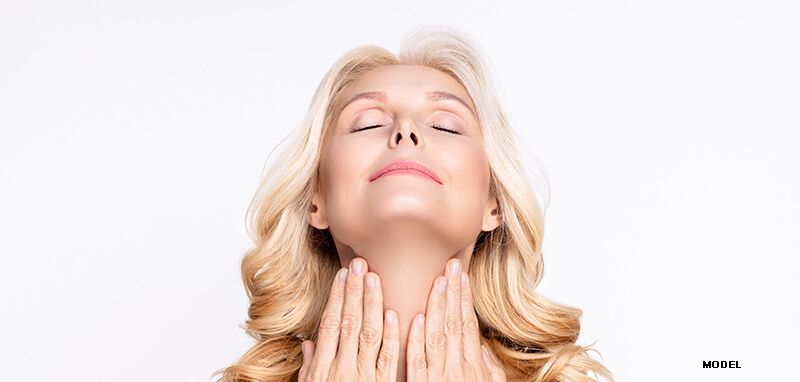The Three Pillars of an Effective Anti-Aging Skin Care Regimen

In the race against aging, the basics can be easily overlooked. Amidst the marketing jargon and hype surrounding the latest anti-aging treatments, a consistent regimen using a foundation of evidence-based ingredients is most important. Building your anti-aging regimen on three core pillars is a great place to start: sunscreen, vitamin C, and retinoids. In this article, we will review these ingredients and how they can help you maintain younger looking skin.
Sunscreen
What It Is and Why It’s Important
Sunscreens are topical products that protect the skin from harmful effects of ultraviolet (UV) radiation. They protect the skin via one of two mechanisms:
1) Physical sunscreens (also known as mineral sunscreens or sunblock) contain inorganic ingredients which reflect ultraviolet light off the skin surface. Examples of common mineral sunscreens include zinc oxide and titanium dioxide.
2) Chemical sunscreens contain organic compounds that absorb the ultraviolet energy into their chemical structure before it can reach the skin and dissipate this energy as heat. Examples of common chemical sunscreens include oxybenzone, avobenzone, octisalate, homosalate, octocrylene, and many others.
- Sunscreens are available in various formulations including lotions, sprays, sticks, and more. The importance of sunscreen in anti-aging cannot be overstated. UV radiation, comprising UVA and UVB rays, causes premature skin aging leading to wrinkles, fine lines, sun damage, and pigmentation. It also causes DNA damage, which can lead to the development of skin cancer.
What to Look for when Choosing a Sunscreen
When choosing a sunscreen, look for these key features:
- Broad spectrum protection: Broad spectrum sunscreens protect against both UVA and UVB rays.
- SPF 30 or higher: The Sun Protection Factor (SPF) indicates the level of UVB protection. SPF 30 sunscreens protect the skin against over 96% of UVB rays. SPF 50 sunscreens protect the skin against 98% of these rays.
- Water resistant: Sweating, swimming and other exercise can cause sunscreen to be washed off the skin surface. Water resistant sunscreens will better protect your skin during these activities.
- Tinted sunscreens: Tinted sunscreens have additional pigment to filter out visible light, which also contributes to photoaging. This pigment also helps camouflage white discoloration that sunscreens can leave behind.
- Mineral sunscreens: If you have sensitive skin, mineral sunscreens may cause less irritation.
Application Tips
- Apply sunscreen generously on all sun-exposed skin 15 minutes before going outside. For the face and neck, you will need about two finger-lengths.
- Reapply at least every two hours, or every 80 minutes if swimming or sweating.
- Do not forget areas like the ears, lips, neck, and the backs of the hands.
- Even if you’re not planning to be outdoors, still wear your sunscreen – UVA rays can penetrate through windows and age your skin while indoors.
Vitamin C
What It Is and Why It’s Important
Vitamin C, also known as ascorbic acid, is a powerful antioxidant that helps protect the skin from free radical damage caused by UV exposure. It is also essential for collagen synthesis, which is important for maintaining the skin’s structural support and youthful appearance.
What to Look for when Choosing a Vitamin C Product
A leave-on vitamin C product such as a serum or moisturizer can help prevent photoaging. Look for products containing “L-ascorbic acid” that come in an opaque or tinted container to prevent oxidation and inactivation of the vitamin C. Vitamin E (also known as tocopherol) will also help the vitamin C to work better, so look for a product containing both ingredients.
Tips on How to Use
- Use Vitamin C products in the morning to take advantage of its photoprotective properties.
- Apply after cleansing and before moisturizing and applying sunscreen.
- Store Vitamin C products in a cool, dark place to prevent oxidation.
- Start with a lower concentration if you have sensitive skin and gradually increase.
Retinoids
What It Is and Why It’s Important
Retinoids are vitamin A derivatives that work by accelerating cell turnover, promoting collagen production, and reducing the breakdown of collagen. They address multiple signs of aging including wrinkles, fine lines, uneven skin texture and dyspigmentation.
What to Look for when Choosing a Retinoid Product
Retinoids are available in multiple formulations including serums, gels, and creams. Most retinoids are prescription medications that can be prescribed by your dermatologist. Examples include tretinoin and tazarotene. Adapalene is another retinoid medication that is available over the counter.
Tips on How to Use
- Apply retinoids at night, as they are inactivated by sunlight and can make the skin more sensitive in the sun.
- A little goes a long way, use a pea-sized amount and apply to clean, dry skin.
- Start with a lower concentration to minimize irritation and gradually increase as your skin builds tolerance.
- Apply 2-3 nights per week, gradually increasing to nightly as tolerated.
- After applying a retinoid, follow with a moisturizer to prevent over-dryness.
A well-rounded anti-aging skincare regimen does not have to be complicated. By focusing on these three pillars—sunscreen, Vitamin C, and retinoids—you can combat the forces of nature and help maintain younger looking skin. Supplementing this regimen with additional products and professional treatments can further enhance your results. If you have additional questions about your regimen or other anti-aging concerns, schedule a consultation with your dermatologist. Remember, consistency and the use of evidence-based ingredients is the foundation for achieving and maintaining age-defying skin.
